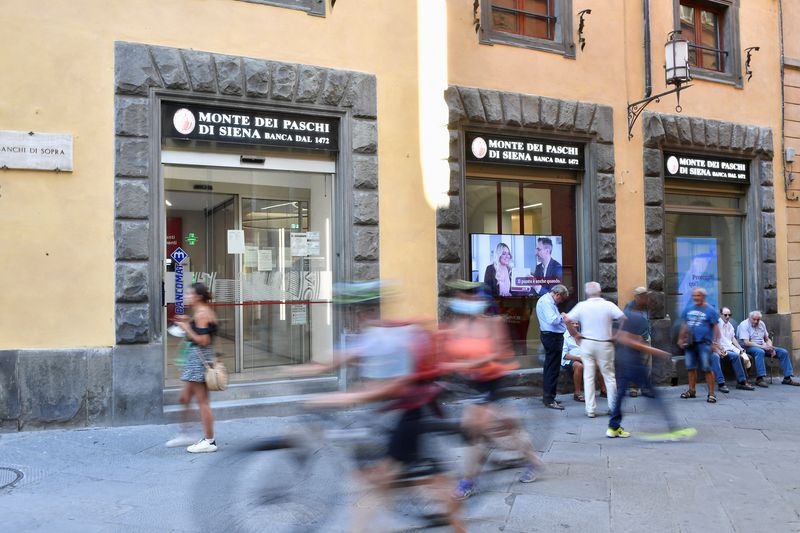By Valentina Za and Giuseppe Fonte
MILAN (Reuters) -Monte dei Paschi di Siena's (MPS) capital raising plan is entering a make-or-break stage with CEO Luigi Lovaglio and the banks due to guarantee the sale hammering out final details, people close to the matter said.
MPS, which is 64% owned by the state after a 2017 bailout, is looking to raise up to 2.5 billion euros ($2.5 billion) by issuing new shares.
The share sale on Oct. 17 would allow MPS to raise funds to help pay for staff cuts under early retirement rules that expire at the end of November - barring new legislation to extend them.
To meet the deadline MPS must approve the terms of the share issue at the very latest by the middle of next week, two people said.
And before that it needs to secure the support of a group of eight banks that have made a preliminary commitment to mop up unsold shares.
With markets gripped by fears about recession, inflation and war, the banks see the deal as too risky to undertake without a pre-commitment from cornerstone investors.
So far however, only French insurer Axa, which sells its products in Italy through MPS branches, has offered to provide support.
Lovaglio has failed to take up a similar offer by another MPS commercial partner, Anima Holding, because unlike Axa the Italian asset manager has also sought a strengthening of the distribution agreement as part of the deal.
Under the structure envisaged by the group of banks, Anima would provide a guarantee commitment that would come before the bank guarantees, meaning it would take on more risk, a person with knowledge of the matter said.
The lenders had expected Lovaglio to have by now obtained commitments in writing from cornerstone investors, two people close to the transaction said.
The diverging views between the consortium and the CEO on how to proceed means it won't be clear until the start of next week whether the capital increase will take place as planned.
The lenders, which are led by Bank of America (NYSE:BAC), Citi, Credit Suisse and Mediobanca (OTC:MDIBY), can walk away thanks to a clause that subjects the underwriting to positive investor feedback.
With MPS' market value equivalent to less than a tenth of the amount the state-owned bank is looking to raise, the banks are exposed to potential losses on the shares left on their books, which will initially value the Tuscan bank above healthier peers.
Under European Union state aid rules, the state can cover 64% of MPS' capital raising, based on its stake in the bank resulting from the 2017 bailout.
The remaining 36% must come from private hands.

Anima and Axa could jointly provide at best only up to 300 million euros, sources have said, adding the consortium had hoped to have formal pre-commitments also from other investors sounded out by Lovaglio, such as holders of the bank's junior debt.
The risk of a conversion into equity has pushed the price of MPS' junior bonds close to half of their nominal value. ($1 = 1.0216 euros)